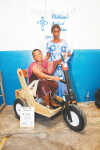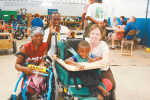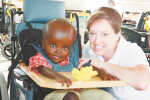Mission: Giving in motion

Herald-Tribune
Seven-year-old Victoria's crying ceased, but tears filled the eyes of many looking on. It was the first time she'd ever really been comfortable, her mother said.
Victoria had just been given the gift of comfort, and the gift of mobility. Victoria was one of about 150 people in African villages and living in remote areas of Tanzania who received wheelchairs or other mobility devices from a mission team joined by Sharon Board, a physical therapist from Nevada.

Victoria has hydrocephalus -- a condition known in lay terms as "water on the brain" in which spinal fluid collects on the brain, enlarging the upper region of the head. Untreated, children with this condition have abnormally large heads. Victoria, Board said, was constantly uncomfortable and unable to hold up her head. Workers adapted a wheelchair for her, carefully fitting it to her, putting it in a reclining position and adding supports for her head.
A man more than 90 years old who'd suffered a stroke was given a pull-PET, or personal energy transportation. Generally, a PET is a three-wheeled device similar to a tricycle with hand operated pedals where the handlebars would normally be. The pull-PET is more like a wagon and is pulled by another person. A seat from an electric wheelchair was put on the device and fitted to the man to give him additional stability.
In fact, many of the chairs and PETs given through the mission trip were heavily customized, Board said.

"It took the whole team," to adapt and fit donated equipment and parts to meet the specific needs of those receiving them, Board said. Partnered with Children's Medical Mission and Hope Haven Mission, the group included people ranging in age from 10 to older than 70, and included therapists, a superintendent of schools, teachers, and farmers.
Often the therapists would identify an adaptation -- reclining, a support here, a pad there -- then others would make it happen.
"One thing that's true about farmers. If there's something that needs to be done, they'll figure out how, and get it done. They'd look at us like we were crazy, scratch their heads and get it done."
Chair pads, for example, were cut to size, then taken to a local tailor who would sew the pad.
"They would be set up out there, with their sewing machines in the dirt, just sewing away," and each time one of the local tailors sewed a pad, the cost was "about a quarter, I think," Board said.
Each recipient was taught how to navigate the equipment on the area's rough terrain, and children and parents were shown how to adapt the equipment to meet the child's future needs as the child grows.
Board said that it was clear that the chairs and devices given would make a difference to many; but one expressed her gratitude in a memorable manner.
Another child with Down Syndrome, a member of the Masaai tribe, had been carried by his mother throughout the 9 or 10 years of his life before being fitted with his wheelchair. His mother was so grateful that, at a community event the following day, she presented Board with a live chicken as a gesture of that gratitude.
"The missionary there told me they do not grow chickens in that tribe, so she would have had to go to the market and buy it, at a great cost to her," Board said, then smiled as one smiles when recalling a particularly warm moment and said, "It's the first time anyone ever gave me a live chicken."
Board's account of the trip overflowed with stories about the people and their need for things like wheelchairs. "There's no access, there," to such mobility equipment; and as people dragged themselves along with hands protected from the harsh ground by a pair of flip-flops or managed to push themselves along using sticks for crutches, the mission group gave away device after device.
Overall, the experience, she said, was often "exhausting, but exhilarating," and the mission didn't stop with the wheelchair distribution. The group had sought ways to help in other aspects of life, and provided toothbrushes, soap, and thousands of pencils.
"Education is a privilege in Africa. If you don't have pencils, you can't go to school," Board said.
Nevertheless, the 16-day trip wasn't all work. The group took time to visit the Indian Ocean and go on a safari, even though the June trip fell in "the dead of winter, so it wasn't very hot. It's near the equator, but it was about 80 or 85 degrees. Not as hot as it might have been," Board said.
The two-day safari was a memorable experience, Board said. The trip was on a game preserve, so wildlife were plentiful.
At one point, she recalled, "We were surrounded by animals -- 40 giraffes, and wildebeasts, gazelles, monkeys -- they were all around us. Animals are curious," and were apparently wondering why this odd group of four vehicles had stopped in an unusual spot. It seemed quite the interesting puzzle to the animals, but the reason for this stop and the remarkable reaction of the animals was simple enough for the humans to understand. One of the vehicles had broken down, so they had all stopped until repairs could be made.
At night, those on safari slept in elevated tents -- raised from the ground as protection from the wanderings of hippos that came out at night to feed. "In the morning, we could see the tracks from the hippos, under our tents."
Animal sounds were plentiful at night. One morning, Board's group awoke to find elephants between them and the next tent, and the campers were awakened at one point by fighting monkeys.
"We were really out in the wild, on the safari," Board said.
Board gained from the experience a great sense of having been able to do something that will make a difference in the lives of the people she described as villagers who live in homes made of mud and sticks or bricks, had many children and were "very hard workers."
"Sometimes we would eat with them. We had mostly rice and beans, sometimes goat. And t here was a lot of fresh fruit -- the pineapple was sooooo sweet. Oh, it was really good," she said.
"We worked hard. I learned a lot. They speak Swahili, and we had a translator," Board said.
She did learn one Swahili phrase well, though -- "Asante sana."
It means, "Thank you very much."
